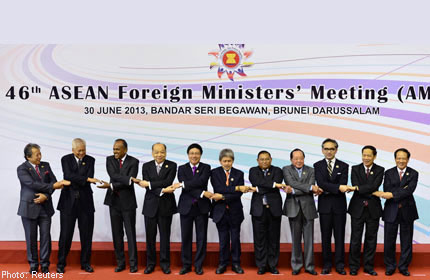
SINGAPORE - Norway made a splash at its debut in this year's ASEAN Ministerial Meeting, as the only new participating country at the July 1 meeting held in Brunei.
It pledged a US$7 million (S$8.9 million) fund to build its commitment to support ASEAN initiatives. Details are being worked out, and one example is Norway's hope to support Myanmar's preparations to assume the role of the ASEAN chair next year.
At the recent ASEAN meeting, Norway also signed the Treaty of Amity and Cooperation, a non-aggression and cooperation pact between ASEAN members and partners that include such non-ASEAN states as the United States, Russia, China and India.
Norway's Foreign Minister Espen Barth Eide said the signing is a natural extension of his country's commitment to multilateralism and settling contentious issues through the peace process.
Norway's involvement in mediation between different political factions in other lands is known.
It facilitated the peace process in Sri Lanka, which was torn apart by a violent struggle for power between the government and rebels from the mid-1970s to 2009.
Last year, negotiators from the Colombian government and a rebel group held, in Norway, their first direct talks in a decade.
And the reason for Norway's stepped-up engagement in Asia: the sheet of melting ice in the Arctic.

Not known to many, Kirkenes is a tiny Norwegian town far up north in the Arctic.
With a population of 3,400, it lists as one of its major attractions an enjoyable meal of stewed reindeer and cod's tongue.
More significantly, its port is strategically important to Norway.
Until now, the town, which is some 20 minutes away by car from the Russian border, was farther away from Asia than virtually any other European port.
The Norwegian port town is now a lot "closer" to Asia because the fast-melting Arctic ice has opened up the Northern Sea Route along Russia's Arctic coastline.
The time taken by ships to travel between Europe and Japan has been slashed by 40 per cent, a strong indicator of how the melting ice is significantly changing international trade patterns.
So when Mr Eide landed in Brunei, one diplomat quipped: "The melting ice in Kirkenes is bringing the Norwegians closer to Asia."
Five new Asian permanent observers in the Arctic Council - Singapore, China, India, South Korea and Japan - were at the Brunei-hosted ASEAN meeting. Set up in 1996, the council has eight permanent members: Norway, Russia, Canada, the US, Denmark, Finland, Iceland and Sweden. This council sets the rules for future development of the polar region.
Observer-status countries in the council, now numbering 32, can listen in on meetings and propose and finance policies.
In Brunei, Mr Eide met and congratulated Singapore's Foreign Minister K. Shanmugam and Second Foreign Minister Grace Fu on membership in the council.
"This development will take Norway's relations with Singapore to a new level," said Mr Eide.
Describing the state of relations between Singapore and Norway as being "excellent", Mr Eide said he had a fruitful discussion with the two ministers on other areas as well. These included Norway's success in encouraging more women to work and to have more babies.
Norway has a high participation of women in its workforce.
Its total fertility rate was 1.95 compared to Singapore's rate of 1.2 two years ago. This rate is used to measure the number of children a woman can have during her childbearing years.
Norway views Singapore as a gateway to Asia. The Republic is Norway's No. 1 hub in Asia, with more than 200 of its companies here.
Most of them are engaged in the maritime industry. Norway was one of the key Arctic nations that helped Singapore enter the Arctic Council this year.
Diplomatic niceties aside, Norway is proving to be a tough competitor to beat in business deals.
Last month, it edged out Singapore and other economic giants like Japan and India, when its telecommunications company Telenor clinched the hotly contested mobile licences in Myanmar.
The only other company that won the bid was Qatar's Ooredoo.
Knocked out of the ring were two Singapore-listed companies - SingTel, considered a front-runner by market observers; and Yoma Strategic Holdings, a company that is in property development.
Now that Norway is "closer" to the ASEAN region, the roar of the cracking ice in Kirkenes may just be felt, if not literally, in Oslo's many initiatives.

